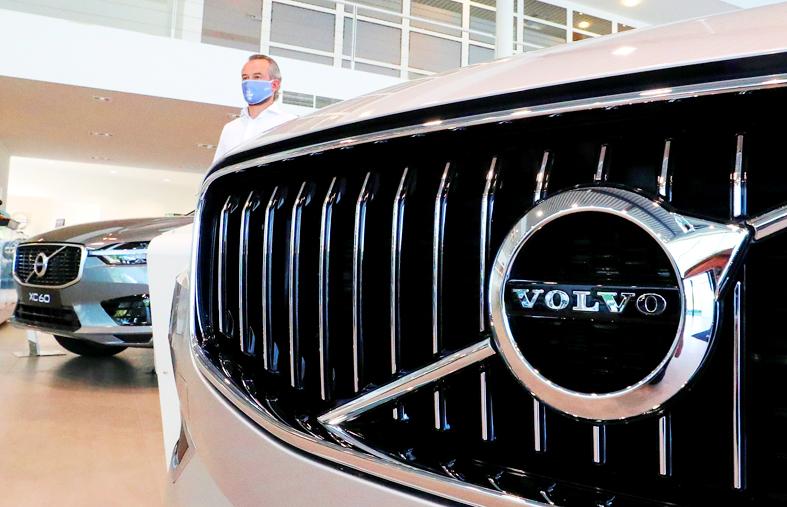Volvo Cars Corp is recalling 54,000 US vehicles for an air bag defect after one crash death tied to the issue, according to a filing with US regulators.
The unit of Geely Automotive Holdings Ltd (吉利汽車) is recalling 2001 to 2003 model S80 and S60 vehicles sold or registered in high humidity US states, because the driver side frontal air bag inflator might rupture, sending metal fragments flying, when the air bag is deployed.
According to the Volvo filing with the US government, it is to replace the inflators with a modern propellant and inflator, and would do so at no cost to customers.

Photo: Reuters
Parts are expected to be available by March.
The National Highway Traffic Safety Administration (NHTSA) on Saturday said that it confirmed one person in the US was killed when a ZF/TRW FG2 twin driver air bag inflator containing the propellant 5AT-148N exploded.
The issue has been the subject of NHTSA and Volvo meetings since August last year.
The agency said the fatal incident was the only known rupture incident for this type of inflator around the world.
NHTSA and Volvo are gathering and reviewing data about other vehicles equipped with these inflators to determine if additional actions are needed, the agency said.
The ZF Group, which has its US headquarters in suburban Detroit, Michigan, on Saturday said that it was first notified by Volvo in August last year of the incident and it “promptly informed NHTSA and, together with Volvo, began investigating the incident.”
NHTSA has investigated for years other air bag inflator ruptures.
The largest automotive recall in history involves about 100 million inflators produced by Japan’s Takata Corp that have been recalled by 19 major automakers worldwide and linked to 26 deaths.
Takata used ammonium nitrate to create a small explosion to inflate air bags in a crash.
Additional reporting by AP

DIVIDED VIEWS: Although the Fed agreed on holding rates steady, some officials see no rate cuts for this year, while 10 policymakers foresee two or more cuts There are a lot of unknowns about the outlook for the economy and interest rates, but US Federal Reserve Chair Jerome Powell signaled at least one thing seems certain: Higher prices are coming. Fed policymakers voted unanimously to hold interest rates steady at a range of 4.25 percent to 4.50 percent for a fourth straight meeting on Wednesday, as they await clarity on whether tariffs would leave a one-time or more lasting mark on inflation. Powell said it is still unclear how much of the bill would fall on the shoulders of consumers, but he expects to learn more about tariffs

NOT JUSTIFIED: The bank’s governor said there would only be a rate cut if inflation falls below 1.5% and economic conditions deteriorate, which have not been detected The central bank yesterday kept its key interest rates unchanged for a fifth consecutive quarter, aligning with market expectations, while slightly lowering its inflation outlook amid signs of cooling price pressures. The move came after the US Federal Reserve held rates steady overnight, despite pressure from US President Donald Trump to cut borrowing costs. Central bank board members unanimously voted to maintain the discount rate at 2 percent, the secured loan rate at 2.375 percent and the overnight lending rate at 4.25 percent. “We consider the policy decision appropriate, although it suggests tightening leaning after factoring in slackening inflation and stable GDP growth,”

Meta Platforms Inc offered US$100 million bonuses to OpenAI employees in an unsuccessful bid to poach the ChatGPT maker’s talent and strengthen its own generative artificial intelligence (AI) teams, OpenAI CEO Sam Altman has said. Facebook’s parent company — a competitor of OpenAI — also offered “giant” annual salaries exceeding US$100 million to OpenAI staffers, Altman said in an interview on the Uncapped with Jack Altman podcast released on Tuesday. “It is crazy,” Sam Altman told his brother Jack in the interview. “I’m really happy that at least so far none of our best people have decided to take them

As they zigzagged from one machine to another in the searing African sun, the workers were covered in black soot. However, the charcoal they were making is known as “green,” and backers hope it can save impoverished Chad from rampant deforestation. Chad, a vast, landlocked country of 19 million people perched at the crossroads of north and central Africa, is steadily turning to desert. It has lost more than 90 percent of its forest cover since the 1970s, hit by climate change and overexploitation of trees for household uses such as cooking, officials say. “Green charcoal” aims to protect what